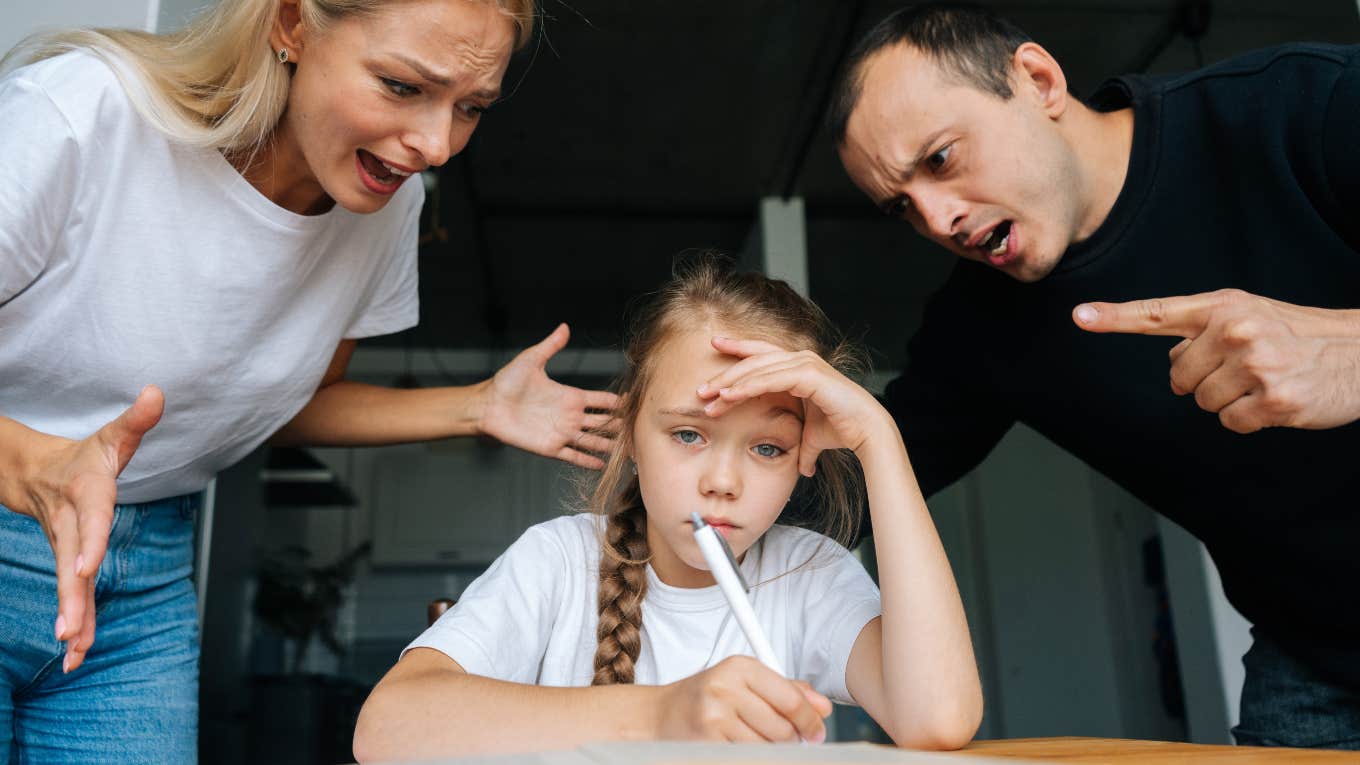Psychologist Reveals The 7 Common Mistakes Parents Make That Often Cause Childhood Trauma
Let your kids know that they're enough.
 Dikushin Dmitry / Shutterstock
Dikushin Dmitry / Shutterstock No parent is perfect, and anyone who holds themselves to an impossibly high standard is bound to fall short. Being a “good enough” parent who tends to your kids’ needs is often the best you can do. Yet even good parents can unintentionally act in ways that cause children harm.
In an Instagram post, clinical psychologist Michaela Dunbar discussed “little t” traumas: Small yet harmful acts that can reverberate through a child’s life, creating lasting trauma.
Here are 7 common mistakes parents make that often cause childhood trauma:
1. Comparing their kids to others
It might seem lighthearted or harmless, but when parents compare their kids to other kids, it can really damage their sense of self. In order to build self-confidence, kids need to know they have value and worth just for being themselves.
It’s an inherent part of human nature to compare ourselves to others, yet when parents compare their kids, it teaches them to define themselves based on other people and not develop their self-worth from the inside out.
Wondering why your kid isn’t more like their friend, cousin, or sibling sends the message that you wish they were different instead of accepting them for who they are on their own terms.
2. Ignoring their kids’ achievements
Kids learn how to treat themselves based on their parents’ behavior. When a parent hesitates to offer their child praise, that child absorbs the idea that they’re not good enough.
Not offering praise when your kid does something well can damage them in the long run. Celebrating your kids’ achievements doesn’t spoil them; it gives them a boost of confidence and teaches them to trust themselves.
Even if it doesn’t seem like a big deal, letting your kids know how proud you are that they did well on a test or tried something new can build up their self-esteem in a lasting way.
 Photo: fizkes / Shutterstock
Photo: fizkes / Shutterstock
3. Leveraging care in exchange for obedient behavior
Some parents position their role as caregivers by expecting their kids to behave exactly how they want them to.
Saying things like, “I feed you, house you, clothe you, and pay your bills,” makes kids think that they’re a burden on their families when, really, it’s a parent’s job to provide for their kids without expecting anything in return.
4. Expecting their kids to fulfill their own childhood dreams
A major part of being a supportive parent is recognizing that your kid has their own identity and dreams, separate from whatever you might want for them.
Just because you never got to live out your dreams as the school star soccer player doesn’t mean your kid will, especially if they’re more into theater.
Pushing expectations onto your kids causes harm and doesn’t give them the space they need to figure out who they are and what they want for themselves.
5. Not spending time with their kids.
Parents who keep their kids at a distance or don’t express affection cause harm, especially as kids grow older and start forming relationships outside of the family system.
We live in a world with constant distractions, and it can be hard to focus on just one thing at a time. Let your kids know that they matter most to you. Put your phone down and spend time with your kids to help lay the foundation for healthy relationships in the future. A little quality time goes a long way.
 Photo: PeopleImages.com - Yuri A / Shutterstock
Photo: PeopleImages.com - Yuri A / Shutterstock
6. Criticizing their kids
Parents who are critical of their children often don’t realize the negative effects of their criticism. Kids internalize their parents’ judgment, which leads them to believe that they’re not enough or that they need to change who they are.
Instead of building strength, criticizing your kids builds insecurities and low self-worth.
7. Refusing to recognize their kids’ problems
When a child presents a problem to their parents, they seek a supportive ear or help to find a solution. By not acknowledging that their kids are struggling, parents make kids feel like they don’t actually matter.
A parent who ignores their kids’ issues isn’t offering the emotional support their kids need in order to thrive, thus contributing to a cycle of trauma, even when they’re not aware of it.
Ultimately, kids need to grow up with the knowledge that they are enough, just as they are. By giving your kids attention, positive reinforcement, and affection, you’re giving them what they need to blossom into healthy, confident adults.
Alexandra Blogier is a writer on YourTango's news and entertainment team. She covers social issues, pop culture, and all things to do with the entertainment industry.

